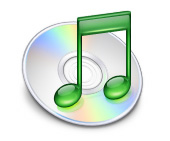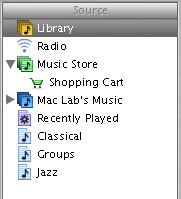
eXtensions
|
iTunes 4: Way to Go (but not if you live outside the US) |

I retain a vivid image of waiting beside a bus stop near the family home in North-west London some time in the late 50s. There was (what seemed at the time) one of the best baker's shops there, with windows full of gorgeous cakes, buns, breads. Separating me from this gastronomic paradise was a huge pane of glass and I was fated always to stare at the sweets within. And then the bus would come and my own tea would instantly make me forget: until the next time.
Apple keeps dangling delights in front of me and, geographical location rather than an empty pocket, are condemning me to look but never touch.
In Europe there have been protests over the inability of Apple to provide the service to produce albums that is built into iPhoto. My white hair will turn back to black before that service appears in Thailand.
In the US and Europe, Apple has been a leader in providing software and hardware to those in education -- all teachers were provided with OSX for free in the US and discounts are plentiful. In Britain, students get special rental deals and the option to buy their PowerBooks after 3 years. The OSX deal for teachers in the UK has just been extended, with massive discounts for other Apple software.
And now, Apple has done it again. I woke up last Tuesday morning to a new version of iTunes (version 4), with its new green icon. It includes the long-rumoured Apple Music Store: online legal purchase of albums and single tracks at reasonable prices and good quality.

Along with the new version, comes an updated version of QuickTime (6.2) that allows users to take advantage of encoding changes and improvements, particularly with AAC (Advanced Audio Coding).
Start up the new iTunes and after a couple of introductory clicks, it is possible (if you are online) to connect directly with the Music Store and the welcoming message: "The iTunes Music Store is not available in your country yet. You will be able to browse music and listen to previews, but you won't be able to purchase music unless your billing address is in the United States."
Click OK, and up comes the window displaying all that there is on offer: behind that virtual plate glass.
I have looked through the listings a few times already and there are several tracks I would love to have in my collection. I have never been attracted to Napster or any other online music listing, and have looked through just to see what might be; up to now preferring my music to be on a solid disk.
Two things have changed that: the awful record shops that now exist in Bangkok -- no sense of cataloguing and the attitude that everyone is a potential thief; and the Macintosh. My collection of CDs is slowly finding its way onto my hard disk because this is my chosen method of playing music these days. Not only is the reproduction quality pretty good, but I have less risk of chewing up the disks: keeping them in their protective cases.
The online albums are priced at around $9.90, with the ability to download individual tracks for $0.99 each. If a download is not completed, it may be repeated until successful: you pay only the once. If you are allowed to pay, that is.
Sharing
One of the supposed attractions of online music sites, and one which was definitely frowned on by Big Music, was the ability to share. Downloads from the Apple Store may be shared with up to three other Mac users. This is built in to iTunes 4. In the list of "sources", alongside the new green Store icon, is a blue "share" icon.

This facility is accessed through the "Advanced" menu, or simply by clicking the Apple key plus the K-key: "Connect to Shared Music". A box pops up in which you enter an address. I entered an IP number that I knew had music to share -- another online Mac user -- and the contents of his playlist were displayed in my copy of iTunes. I could not copy any item into my library, nor (in some cases) could I play them as they had been purchased from the Music Store and I have no password.
Some tracks, however, are available to me; but with a 56k modem, the stream is unsatisfactory and the music kept stopping while "rebuffering". Here is one more argument for a broadband connection.
So, Steve Jobs has provided me with the hardware and the software to "rip, mix, burn" or simply play; and also dangled the iPod so that I could make my collection portable -- we used to record the CDs onto casettes before -- and then, along with the record companies and banks, brought down the shutters because I cannot be billed in the US.
Hypothetically, someone in the office next door could do this; but my theoretical person could not share one track with me. I used to have a credit card issued in the US (several actually) but have now consolidated my spending -- I have it more or less under control -- with one card, issued in Thailand. And that, ironically, is issued by a US-based bank.
Most of my software comes via the Internet and the credit card. My motorcycle parts come pretty much by the same route. But this is music -- a commodity I had not thought of in the past as accessible this way. Now the bait has been dangled in front of me and thouands of others.

It reminds me of when I first arrived in Thailand and bought a PC. In those days, there was no software. I mean zero: nothing. At least not legally. The software companies all thought that Thailand was a bad land where software was stolen, so to prevent that, they would not send any. So everyone got software where they could (in pre-Phantip days this usually meant Mahboonkrong or some of the sois off Sukhumvit), thus the software companies themselves established an alternative industry. In the main, thus far, only some of the games companies have woken up to this and special editions for Thailand are available.
The record companies have been behaving just like the software companies here, but are now beginning to come round, at least in the US. They may be coming round to Apple's service faster than they thought they would. In the first 18 hours of the service, 275,000 tracks were downloaded, so others must be having the same thoughts on music as me. Apple are planning to extend the service to Windows users within a few months and are currently rumoured to be recruiting suitably qualified programmers.
I hope that the service is extended to some more of the World's Mac users, including those of us who are usually forgotten.
Additional Note
I quote a figure (above) of 275,000 tracks in 18 hours. In the first seven days, downloads were in excess of 1 million.
Additional Note (2) In a few weeks, sales had exceeded several millions and other services began to spring up with varying degrees of success and sophistication.
For further information, e-mail to Graham K. Rogers.
Back to
eXtensions
Back to homepage